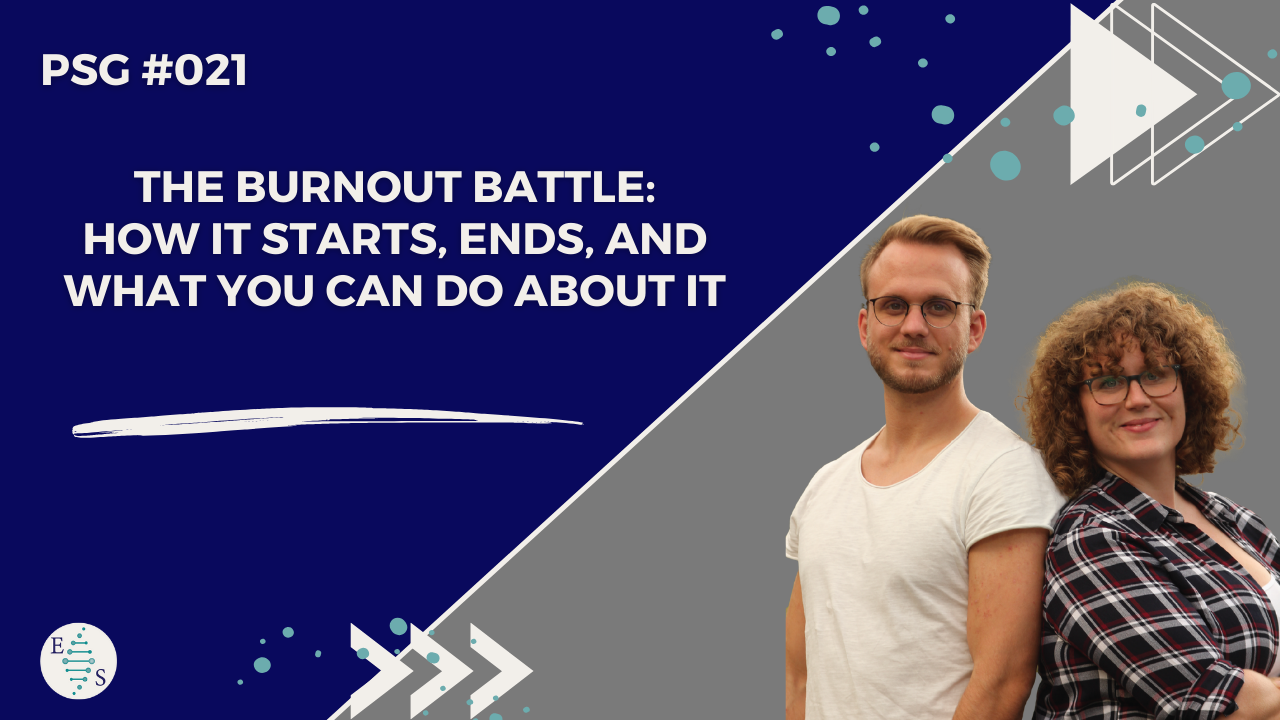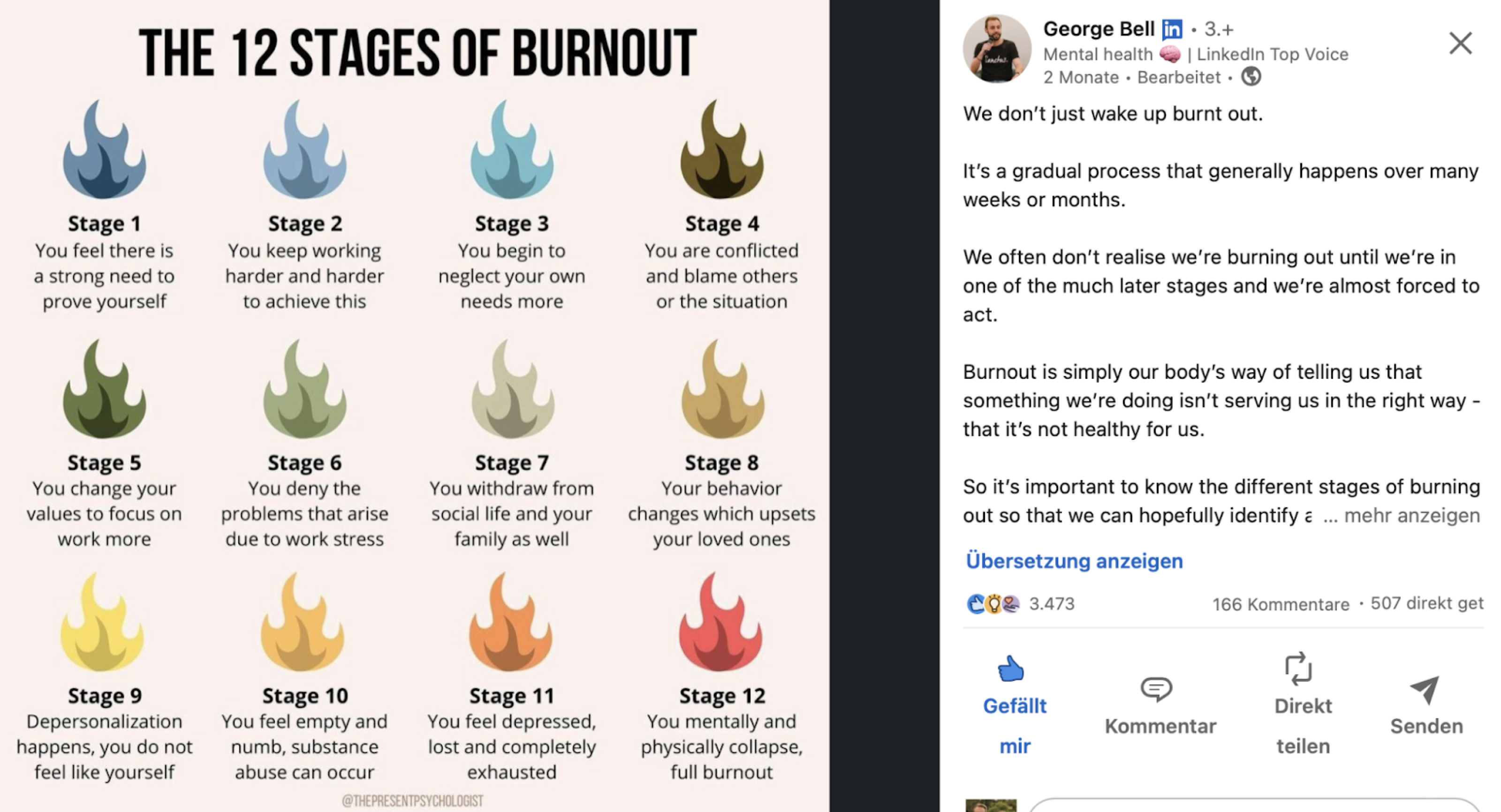
PSG #021: The Burnout Battle: How It Starts, Ends, and What You Can Do About It
Sep 17, 2023Are you feeling overwhelmed and exhausted? You may be dealing with burnout. The Burnout Battle is real, but don't worry, you can fight it.
Understanding how the battle starts, and what you can do to combat it, is the key to winning.
So take the first step and get informed - your mental health and well-being depend on it.
1. Introduction: What is Burnout and How It Starts
Burnout is a term that we hear quite often these days, but what exactly is it?
Burnout is a state of emotional, physical, and mental exhaustion caused by prolonged stress.
It can affect anyone, anywhere, at any time.
Burnout is more than just feeling tired or overworked. It's a serious condition that can greatly affect your mental and physical health.
Burnout can start slowly, and it can be challenging to recognize the early warning signs. Believe me, I’ve been there…
You can take steps to prevent burnout before it becomes a significant problem!
Understanding the different stages of burnout and identifying your stress triggers, is a game changer.
Today, we will explore the different stages of burnout. We learn how to identify stress triggers and discuss self-care strategies to combat burnout.
But we will also talk about the importance of reassessing your goals and priorities in life and seeking professional help if needed.
By taking control of your mental health and well-being, you can overcome burnout and lead a happier, more fulfilling life.
2. The Different Phases of Burnout
Burnout is a condition that is often characterized by emotional exhaustion, cynicism or detachment, and a decreased sense of accomplishment or effectiveness.
Yet, burnout does not happen all at once.
It is a gradual process that can take weeks, months, or even years to develop.
The different stages of burnout include the honeymoon phase, the onset of stress, chronic stress, and burnout.
The honeymoon phase is where you may feel excited and motivated about your work. You want and can give it all, no hours are too long!
But as you continue to push yourself, you may start to experience stress.
Chronic stress is where you may feel overwhelmed and exhausted, and if you don't take action, you may eventually reach burnout.
Understanding the different stages of burnout is crucial to help you identify the early signs and take action before it's too late.
3. Understanding risk factors, your Stress Triggers and Getting to the Root of the Problem
It's essential to understand your stress triggers and get to the root of the problem if you want to combat burnout.
Identifying what causes you stress and anxiety can help you develop coping mechanisms to manage it.
Stress triggers can be anything from a demanding workload to personal relationships and finances.
It can be a special environment, a co-worker or a situation.
As a PhD candidate, you are working in an environment full of high achievers where overworking is normalized and even expected. This increases the risk of burnout!
Understanding what triggers your stress can help you make changes to your lifestyle and habits to reduce its impact.
Take some time to reflect on what causes you stress and how it affects your mental and physical health.
Once you identify your stress triggers, you can work towards finding solutions to alleviate them. It's important to remember that everyone's stress triggers are different, and what works for one person may not work for another. And of course, you can eliminate all triggers but you can learn to handle them in a better way.
By taking control of your stress triggers, you can take steps towards avoiding burnout.
This will let you maintain your mental well-being.
4. Preventions against burnout
Learning self-care strategies is essential in combating burnout. It is crucial to focus on taking care of yourself before taking care of others.
Self-care strategies can range from small activities like:
- taking a walk
- reading a book
- meditation
- exercise
- spending time with loved ones
to more significant changes like :
- reassessing your goals and priorities in life.
- Getting help from a coach
- or going to therapy
These small things might sound a bit silly and too small to really change something. But it’s really these small things, done consistently, that help you be more resilient, handle stress better and stay healthy. Incorporating these really improved my overall well-being and resilience and it can do the same for you.
It's important to find what works for you and make it a habit. Remember, self-care is not selfish; it's necessary for your mental health and well-being. Especially when you are doing a PhD, you need to learn to incorporate self-care into your full days.
Additionally, getting professional help is always an option if you feel like you need it. Don't be afraid to seek help when you need it. It can be very helpful because a person looking from the outside and being neutral can help you realize areas that need change that you were blind to.
By implementing self-care strategies and reassessing your goals, you can combat burnout and take care of yourself.
5. Reassess Your Goals and Priorities in Life
One important step in combating burnout is to reassess your goals and priorities in life.
Often, we get so caught up in the daily grind that we forget to take a step back and check what truly matters to us. Especially as PhD candidate, you are so busy that you rarely or even never stop and take some time to think things through.
Are you spending our time and energy on the things that bring you joy and fulfilment, or are you just going through the motions? Of course, you can not only do things that are fun, some things just have to get done. But you can make sure to incorporate as many fun things as possible!
Take some time to reflect on what you want to achieve in life and what truly makes you happy. Are you working towards those goals, or are you stuck in a rut? It's okay to pivot and change direction if needed. Remember, your goals and priorities may shift over time, and that's perfectly normal.
By reassessing your goals and priorities, you can gain a renewed sense of purpose and motivation, which can help combat burnout.
So take a deep breath, step back, and reflect on what truly matters to you.
6. Get Professional Help If Needed
It's important to remember that burnout is a serious issue and seeking professional help should never be a sign of weakness.
If you've tried to combat burnout on your own and still find yourself struggling. It may be time to seek the help of a mental health professional. Don’t hesitate for too long!
A therapist can help you identify the root cause of your burnout and work with you to develop a personalized plan for recovery.
They can also provide you with valuable tools and techniques to manage your stress. They also help to prevent burnout from happening again in the future.
Remember, taking care of your mental health is as important as taking care of your physical health.
Seeking help when you need it is a brave and proactive step towards a healthier, happier you.
7. Conclusion: Taking Control Over Your Mental Health and Well-Being
In conclusion, taking control over your mental health and well-being is crucial in preventing and combating burnout.
It's important to understand the different stages of burnout and identify your stress triggers to get to the root of the problem.
Learning self-care strategies, such as meditation, exercise, and spending time with loved ones is crucial. It can help you manage stress and prevent burnout from taking over your life.
Reassessing your goals and priorities in life can also help you create a more balanced and fulfilling lifestyle.
And if you find yourself struggling to manage your mental health, don't hesitate to seek professional help.
Remember, taking care of yourself is not selfish, it's necessary for your whole well-being.
Action step for this week: start making small changes today and focus on your mental health and well-being. You got this!
See you next week!
PhD survival guide is a free newsletter. Please support by sharing with those who may benefit from this post.
If you want more help:
We're excited to share the PhD Survival System with you because we know how tough it can be to get through a PhD program. We have developed a holistic system combining all the necessary areas to obtain optimal results.
We start with the foundation, your mindset and on top of that we building two pillars with time management and stress management.
More about the PhD Survival System here:
Stay connected!
Join our newsletter to receive the latest posts!
Don't worry, your information will not be shared.
We hate SPAM. We will never sell your information, for any reason.
